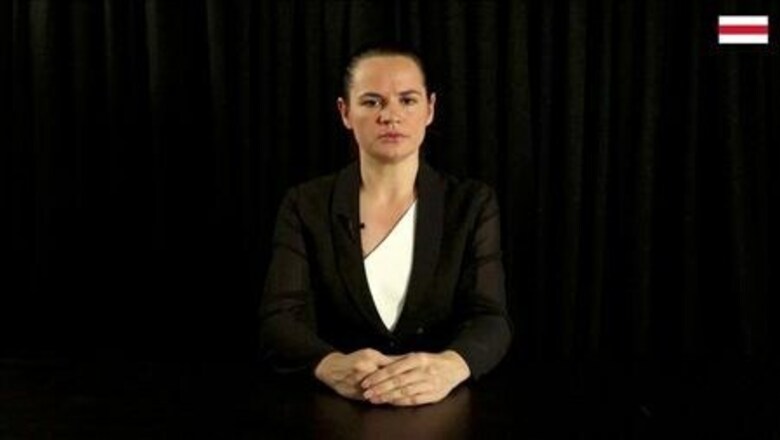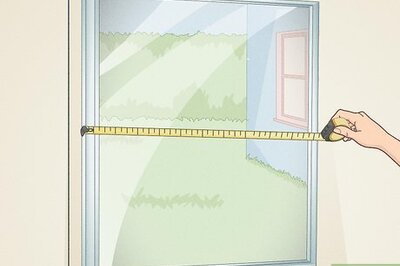
views
MINSK/BRUSSELS European Union leaders holding an emergency summit were expected to endorse sanctions on Belarusian officials blamed for election fraud on Wednesday, but signalled reluctance to take steps that might be seen as a bid to pry the country from Moscow’s orbit.
President Alexander Lukashenko has faced mass street demonstrations since officials declared he had been reelected on Aug. 9 in a vote his opponents say was rigged. Authorities have cracked down on his opponents with thousands of arrests.
It is the biggest crisis in a former Soviet state since a popular uprising toppled a pro-Moscow leader in Ukraine six years ago, which led to Russian military intervention and Europe’s deadliest ongoing conflict.
“Violence has to stop and a peaceful and inclusive dialogue has to be launched. The leadership of #Belarus must reflect the will of the people,” Charles Michel, the EU summit chairman, wrote in a tweet announcing the start of the video meeting.
The European leaders are expected to endorse financial restrictions on Belarus officials they hold responsible for election fraud and the crackdown on protesters.
But EU officials made clear they had little appetite for a bold stance in support of the opposition, which might trigger intervention from Moscow.
“Belarus is not Europe,” EU Industry Commissioner Thierry Breton said, comparing it to pro-Western Ukraine and Georgia, both targets of Russian military operations. “Belarus is really strongly connected with Russia and the majority of the population is favourable to close links with Russia.”
Sviatlana Tsikhanouskaya, a 37-year-old political novice who stood as the main challenger to Lukashenko in the election after better-known opposition figures were jailed or banned from standing, had urged EU leaders to reject Lukashenko’s victory.
“I call on you not to recognise these fraudulent elections,” Tsikhanouskaya said, speaking in English in a video address from exile in neighbouring Lithuania, where she fled after the vote her followers say she won. “Mr. Lukashenko has lost all legitimacy in the eyes of our nation and the world.”
Lukashenko, a former collective farm boss who has run Belarus for 26 years, appears to have underestimated the public anger in the country after official results gave him victory with 80 percent of the vote. Large state-owned factories have gone on strike in sympathy with protesters, and the authorities have acknowledged some police officers have quit their posts.
Speaking to his security council on Wednesday, Lukashenko repeated accusations that the protesters are funded from abroad.
MOSCOW’S RESPONSE
Attention is firmly focused on how Russia will respond to the crisis. Of all the former Soviet republics, Belarus has by far the closest economic, cultural and political ties to Russia, and its territory is central to Russia’s self defence. Since the 1990s, the two countries have proclaimed themselves part of a “union state”, complete with a Soviet-style red flag.
Flight tracking data showed a Russian government plane used in the past to carry senior government officials, including the head of the FSB security service, had made a quick flight to Belarus and back. Russian and Belarus officials did not publicly comment on the flight.
Despite their close ties, Russian President Vladimir Putin has had a difficult personal relationship with Lukashenko. The Kremlin now faces the choice of whether to stick with him as his authority appears to drain away, or try to manage a transition to a new leader who would keep Minsk in Moscow’s orbit.
Opposition figures set up a council on Tuesday to negotiate a transition. Lukashenko denounced it as an attempt to seize power and said he would take appropriate measures.
Putin has offered Lukashenko military help if needed. During phone conversations on Tuesday the Russian leader warned German Chancellor Angela Merkel and French President Emmanuel Macron against meddling in Belarusian affairs.
The protests have spread to some of the country’s major industrial plants that underpin Lukashenko’s Soviet-style economic model. Police dispersed a demonstration and detained two people at the Minsk Tractor Works (MTZ) plant on Wednesday.
Police also took control of the main state drama theatre in Minsk. The theatre became a flashpoint for protests when its director, a former Belarusian diplomat, was fired after speaking out in favour of the protests.
Disclaimer: This post has been auto-published from an agency feed without any modifications to the text and has not been reviewed by an editor



















Comments
0 comment